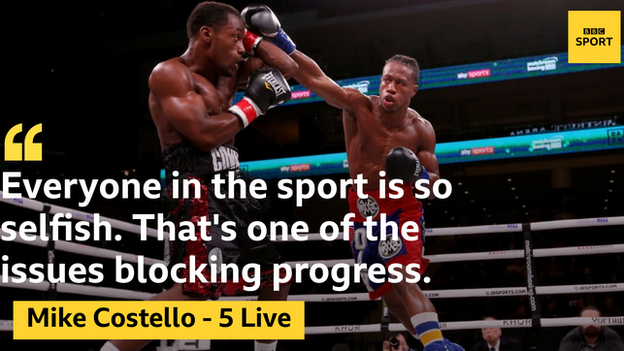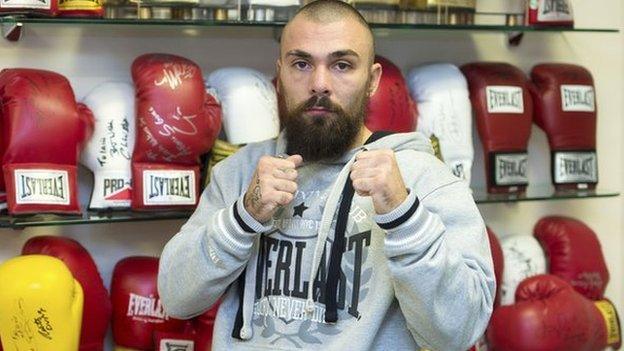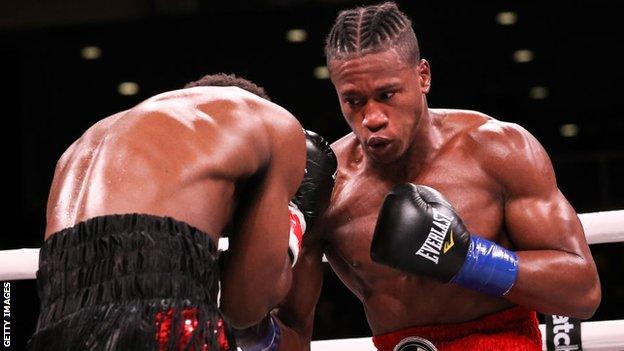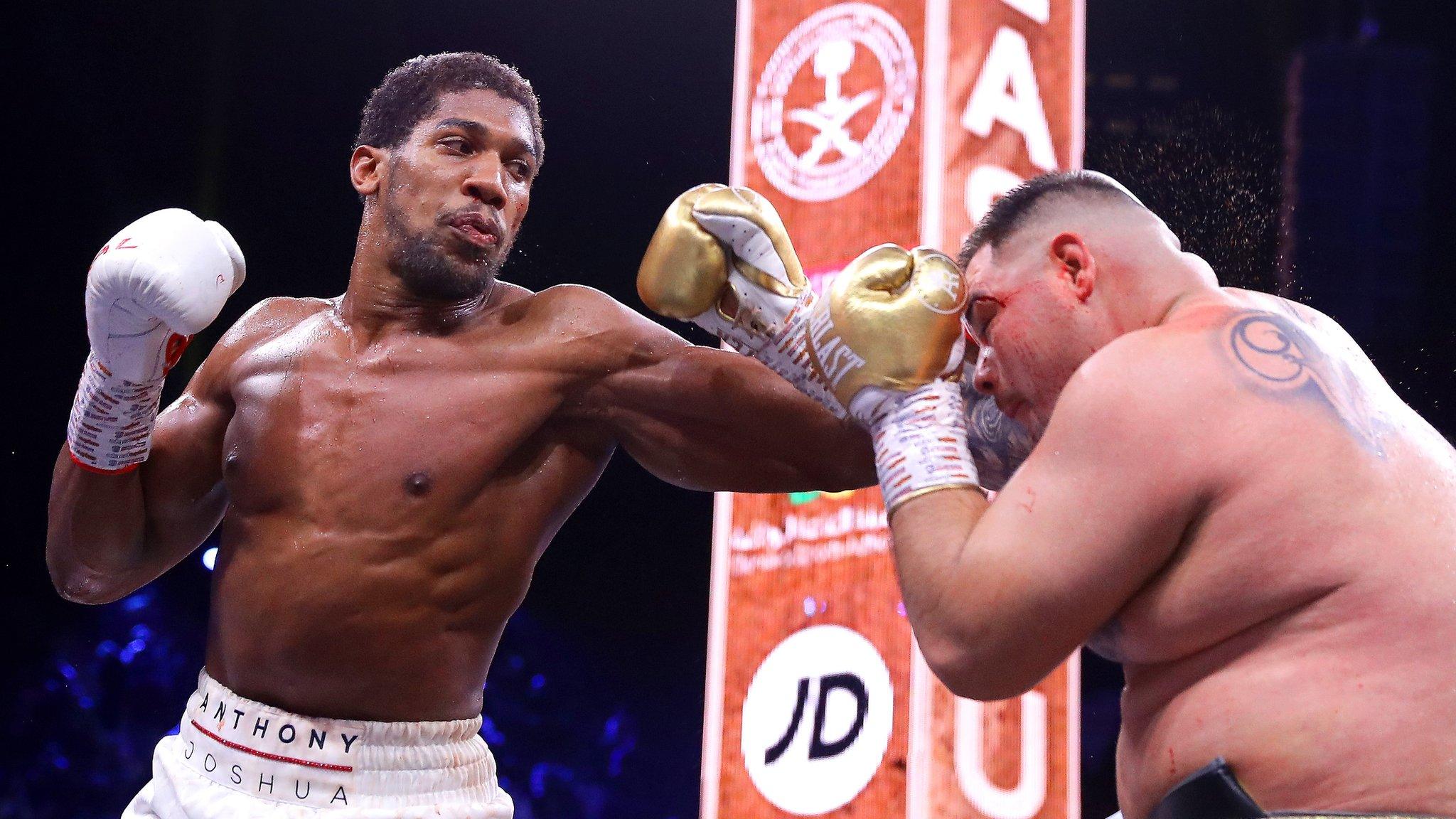Patrick Day: Mike Costello & Steve Bunce analyse boxing's search for safety answers
- Published

Mike Costello and Steve Bunce debated who could fund frequent brain scans in boxing
A selfish culture in boxing blocks progress in safeguarding fighters, say the 5 Live Boxing team.
The sport has been awash with tributes and faced scrutiny since American Patrick Day last week became the fourth boxer to die in recent months.
Promoter Eddie Hearn spoke of improving safety, while brain-injury charity Headway wants the sport banned.
In a lengthy debate on the 5 Live Boxing podcast, Mike Costello and Steve Bunce discussed potential changes and the barriers blocking the way.
Selfishness, safety and scans
Eddie Hearn in tears over death of boxer Patrick Day
Costello, like Hearn, is keen on fighters having brain scans more frequently than the one a year needed during a British Boxing Board of Control medical.
The key question is how would additional scans be funded? There have been several attempts to set up a centralised, powerful union charged with improving the rights and safety of fighters, but gaining financial contributions from boxers has not proved possible.
"I know how hard it was to get boxers and people involved on board to kick in any money at all," says Costello.
"Just some of the contests I have seen recently, boxers have take some seriously heavy hits.
"Should it be that both fighters before they box again have to have a scan and not only when their annual medical comes up? Is it the boxer himself who pays for that? The promoter? Or a fund that the sport as a whole comes together to raise?
"Everyone in the sport - maybe it's why some are successful - is so selfish. That's one of the issues blocking progress in terms of looking at any of the safety measures.
"What about a percentage, maybe just 1% of all television rights put into a special fund for medical assistance or for extra brain scans? I do think the brain scans could be a key component in moving forward."
The cost of MRI scans can vary but they generally exceed £350. While the sum may not seem much in isolation there are often more than half a dozen boxing shows in the UK on any given weekend, featuring well over 100 fighters in all.
The volume of competitors, some of whom are earning humble amounts on undercards, adds to the dilemma in funding regular scanning.
"In the early 1990s, which was a bad time for death in boxing, that was when the Board of Control made the MRI scan compulsory," says Bunce.
"Promoter Frank Warren kicked in around £200,000 from his own pocket. He asked all board licence holders to kick in some money. That means every boxer, agent, promoter and board stewards. How many people chipped in? One. That is an established fact.
"The scans are the only way."
Self policing - ideal but idealistic

Scottish boxer Mike Towell wanted a CT scan weeks before his death after a bout
Day's death, aged 27, came four days after he was floored three times in a 10th-round stoppage defeat by Charles Conwell in Chicago.
In the aftermath, American fighter Regis Prograis - in the UK to face Scotland's Josh Taylor on Saturday - was one of several boxers searching for answers on how to improve safety and said some must self police.
Prograis cites better practice around weight cutting and says wider willingness to withdraw from fights if a fighter is not feeling healthy would be beneficial.
"If you look back at the inquiry of the late fighter Mike Towell, one of the findings was his own drive and commitment led to his untimely death," added Costello.
"He was having headaches in the build-up and maybe a brain scan might have prevented that fight. That is one specific case. It is, I think, absolutely key that we look at the introduction of some self-policing and helping fighters who maybe can't help themselves because they are too committed to the cause."
Improved education may be an avenue to better self-policing but in a sport where fighters compete on undercards in hotels, restaurants and leisure centres with dreams of one day filling out arenas, it is hard to contemplate an uplift in the numbers turning down contests due to a safety-first attitude.
Bunce added: "People will say I am over the top but fighters lie. They lie about what weight they are at the night before, about what they ate and some trainers are in denial. It's OK saying 'police yourself better' but I can draft that now and it means nothing just coming up with empty words.
"Sure those things collectively would without a doubt help us reduce the chance of another Patrick Day soon but it's a big jump."
Knockout gloves or safer gloves?

Day (right) had 17 wins, three losses and a draw on his record before facing Conwell
Bunce said it is "impossible" to defend boxing, as the sport came under fire after Day's death.
One possible way forward he feels would be to look at glove technology.
Fighters spar with heavier, more naturally padded gloves in the build-up to a fight but then compete in lighter gloves, thus limiting the cushion between hand and opponent.
Furthermore, some gloves have a reputation for being more punishing on an opponent - often known as a 'banger's glove' - while some fighters may opt for something more padded if they have had issues with hand injuries in the past.
"All of the advances in gloves is to make them better for knocking someone out, not to make them safer," said Bunce.
"It's about maintaining their weight but reducing them in size to make them slicker. So if you put on a pair of 10oz puncher's gloves and a pair of Board of Control gloves from five years ago, one would feel like a pair of driving gloves and the other would feel like having two pillows taped to your hands.
"I am staggered there has not been more technology looking at the safety side rather than making them more lethal."
Will boxing change or just move on?
Day's promoter Lou DiBella called on the sport to "honour the legacy" of his fighter by making boxing safer.
To create change may take more than finding a way to fund the additional brain scans many seem to advocate. A true pause for breath to fully contemplate adjustments may be required in a sport that operates at a hectic pace all year round.
"What interests me around stories like this is how boxing moves on," adds Costello. "Within a couple of days last week I saw promoter Eddie Hearn in tears in an interview with IFL TV remembering his conversation with Day a week earlier. A couple of days later he is talking of how he is buzzing after terrific fights on his bill in Newcastle.
"It made me think of 1995. We had the James Murray tragedy, he died in a British title fight. We also had Gerald McClellan sustaining life-changing injuries.
"In the same year you had Frank Bruno winning the world heavyweight title at the fourth attempt, one of the most memorable nights I have ever been at. There was also Naseem Hamed becoming world champion, so there you have in a single year that juxtaposition and the battering of emotions that boxing gives you."
- Published7 December 2019
